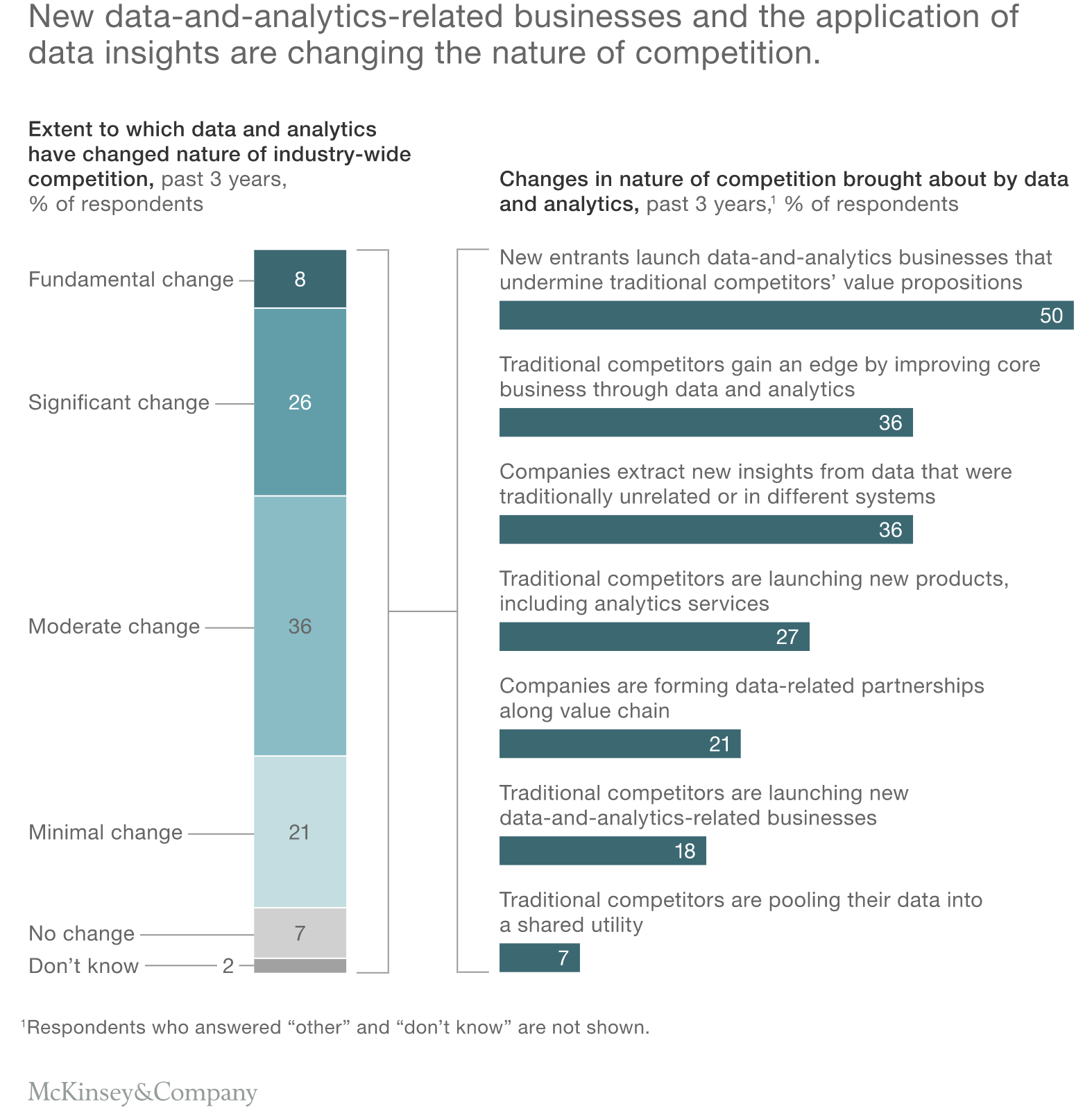Data Monetization – What it is & Why You Should Sit Up and Take Notice
What exactly is data monetization, and why should your company be paying attention? The short answer: Revenue and added value for customers. We'll explore the longer version in this post.

Data monetization is becoming increasingly important in our business landscape. In today’s data-driven world, companies are constantly seeking ways to harness the power of their data to drive growth, improve decision-making, and unlock new revenue streams. Data monetization is an excellent way to achieve this. But what exactly is data monetization, and why should your company be paying attention? The short answer: Revenue and added value for customers.
We’ll explore the longer version in this post – the ins and outs of data monetization, including strategies, tools, and real-life examples. So, let’s dive right in!
What is Data Monetization?
Data monetization is the process of converting raw data into valuable insights, products, or services that can be sold or utilized for business growth. It allows organizations to capitalize on their data assets by generating new revenue streams or enhancing existing ones. There are two main types of data monetization: internal and external.
Internal data monetization focuses on using data to improve internal processes. For instance, if customer success managers are empowered with usage data, they can proactively spot opportunities for upsells, which translates to more revenue.
External data monetization, on the other hand, involves selling data or insights derived from data to external customers, partners, or stakeholders. This can be achieved through various methods, including selling raw data, offering data analytics services, or embedding analytics into existing products or services. A good example of this is Spotify – they collect data on listening and usage patterns and share this with artists which helps them get a better understanding of their target audiences, shape their upcoming music, and much more.
5 Reasons Why Data Monetization is Key for Your Company

Data monetization can be a game-changer for your organization. Here are some reasons why:
- Unlock new revenue streams: Data monetization allows you to tap into new markets and customer segments by offering valuable data-based products or services. The business world is going through a tough period today – uncovering new opportunities to generate a new revenue stream to provide added value is crucial for your bottom line today.
- Enhance customer experience: By providing insights derived from data, you can help customers make better decisions, ultimately improving their experience with your brand.
- Improve internal processes: Data monetization can lead to better decision-making and more efficient operations, driving cost savings and increased profitability. Here’s a simple example: by using data to understand how your suppliers work with your logistics provider can help you figure out potential bottlenecks and hitches so you can take preventive measures or include an appropriate buffer in your planning. This helps you meet your SLAs and provide a better overall customer experience.
- Stay competitive: As more businesses adopt data-driven strategies, staying ahead of the curve by monetizing your data can give you a competitive edge in the market. In the wake of the generative AI wave, every company that is making good use of their data is in the limelight and this can become a powerful X factor that distinguishes you from your competitors.
- Foster innovation: Data monetization encourages organizations to explore new ways of utilizing their data, leading to innovative products and services.
How to Get Started with Data Monetization
Let’s be honest: getting started with data monetization is challenging. But, it is also very rewarding. First, you need to identify the data assets within your organization that have the potential to generate value. This includes assessing the quality, relevance, and completeness of the data you collect. Next, determine the best way to monetize this data probably with the help of an ETL process – whether it’s through internal optimization, creating new products or services, or partnering with third parties.
Partnering with a third party when it comes to creating the actual product can be very rewarding for three main reasons. Firstly, if your company’s core competency is in, say creating payment gateways, it will require your dev team to learn a whole new set of skills in order to go about monetizing your data – not to mention bugs, testing etc. If you go for a solution that is already ready, you can provide a native experience to your customers without having to build everything from scratch.
Secondly, this enables you to be faster and reduces your time to market. You can give your customers exactly what they want when they want it, without reinventing the wheel.
Lastly, this enables you to test your hypothesis on a very lean set of resources – you can iterate easily on your solution and efficiently use the resources at hand.
Once you have a clear understanding of your data assets and the monetization opportunities they offer, develop a data monetization strategy that aligns with your organization’s overall business objectives. This strategy should outline the specific goals you aim to achieve, the steps required to reach those goals, and the resources needed for successful execution.
Finally, ensure that you have the necessary tools and technologies in place to support your data monetization efforts. With these foundational elements in place, you’ll be well on your way to successfully monetizing your data and driving value for your organization.
Your Toolbox for Data Monetization

Successful data monetization requires the right mix of tools and technologies. Some of these include:
- Traditional dashboarding platforms: Tools like Tableau, PowerBI, and Looker enable organizations to analyze and visualize their data, using dashboards, for better decision-making.
- Data management solutions: Platforms such as Airbyte, dbt, and Fivetran help businesses manage, integrate, and transform their data for monetization purposes.
- Embedded analytics products: Solutions like our very own Veezoo for Embedded Analytics enable companies to integrate data analytics into their existing products or services, opening up new monetization opportunities.
- Data Warehouses: Platforms like BigQuery,Redshift, and Snowflake Data Marketplace allow organizations to store their data efficiently.
Out of the 5 approaches mentioned above, one of the most promising ones in recent years is the use of embedded analytics, especially for software of any sort. This is because embedded analytics allows you to integrate powerful data analysis and visualization capabilities directly into your existing applications, providing users with a seamless, personalized experience.
In the context of data monetization projects, embedded analytics can cater to a diverse range of users with varying needs. Different customers may require different types of dashboards and visualizations to address their specific questions and concerns. Traditional dashboarding solutions can become overly complicated and may not provide the answers users seek, leading to underutilized dashboards.
Embedded self-service analytics vs traditional dashboard-based analytics, on the other hand, can offer a more tailored (meaning you don’t need to have a set of homogenous users), user-friendly experience. A conversational AI interface, such as Veezoo’s embedded analytics product, allows users to ask personalized questions and receive answers quickly and efficiently. A very differentiated set of users can take advantage of this solution. At the same time, this approach saves time and resources that would otherwise be spent creating numerous dashboards that might not be used and significantly lowers your time to market.
In summary, adopting embedded analytics for data monetization can provide a more intuitive, user-centric experience for your customers while helping you unlock the full potential of your data. By integrating embedded analytics into your software, you can create a more valuable offering for your users, driving adoption, and increasing revenue.
Tips for Your Data Monetization Business Model
Once you’ve decided to explore data monetization, it’s time to figure out your business model. While each company is unique in its requirements, there are some things- common to most companies – that you should keep in mind when developing your data monetization business model:
- Align with your core business: There’s no way around this one. When you’re diving into data monetization, it’s important to ensure that it goes hand-in-hand with your existing products or services. You want all components to work together to boost the overall value of what you’re offering. As you plan your data monetization strategies, keep your current offerings in mind and look for ways to enhance them. It’s all about giving your customers an even better experience while making the most out of the data you’ve got!
- Focus on customer needs: It’s essential to really get to know your customers when focusing on your data monetization strategies. Instead of a one-size-fits-all approach, you should aim to design data-driven solutions tailored to address their specific needs. By doing this, you’ll be able to create more value for your customers, making your data monetization efforts more successful in the long run.
- Price appropriately: Figuring out the perfect pricing model for your data-based offerings can be a bit tricky, but it’s super important. You’ll need to take into account factors like the value your offerings provide, who your target market is, and what your competition is doing. It’s all about striking the right balance so your customers feel like they’re getting a great deal (while you’re still making a profit). So, take some time to do your research, chat with your target market, and keep an eye on the competition – it’ll help you nail down that sweet spot for pricing your data-based offerings just right.
- Emphasize data security and privacy: This is a big one when you’re working on data monetization – in fact, it’s crucial to address those concerns head-on. Make sure you’ve got strong security measures in place and be transparent about how you’re using customer data. Being open and honest about your practices will help build trust with your customers and show them that you take their privacy seriously. So, don’t shy away from those conversations – tackle them head-on and make data privacy a top priority.
- Continuously innovate: Staying ahead of the game! That’s right – when it comes to data monetization, you’ve got to keep exploring fresh and innovative ways to make the most of your data and improve your offerings. Don’t let the competition outpace you. Instead, stay curious, be creative, and keep pushing the envelope to ensure you’re always at the cutting edge of data monetization. You’ve got this!
Data Monetization Examples Across Industries

As per the research above, McKinsey has demonstrated that data monetization has significantly changed business models and overall strategy today.
To spark your imagination and provide some context, let’s explore a few data monetization examples from various industries:
- Payment providers: Companies like Visa and Mastercard have access to vast amounts of transaction data. They can monetize this data by offering insights and analytics services to merchants, helping them better understand their customers and optimize their operations.
- Insurance companies: Insurers or Re-Insurers like SwissRe, can leverage their data on claims, customer demographics, and risk profiles to create value-added services, such as personalized coverage recommendations and risk mitigation tools.
- Telecommunications: Telecom providers can analyze their customer data that can help city planners improve connectivity, road safety
- Healthcare: Hospitals and healthcare providers can use patient data to develop new treatment protocols, identify trends in patient outcomes, and improve overall care quality.
- Retail: Retailers can analyze customer purchase data to create personalized shopping experiences, offer targeted promotions, and optimize inventory management.
Conclusion
Data monetization is a powerful strategy that can unlock significant value for your organization. By understanding what data monetization can mean for your organization, why it’s essential, and how to implement it effectively, you can position your business for long-term success in the data-driven economy.
Leverage the power of your data to fuel growth, innovation, and a competitive advantage – and if you’re looking for a partner with whom you can develop your data monetization strategy, don’t hesitate to reach out.
It’s a win-win!


